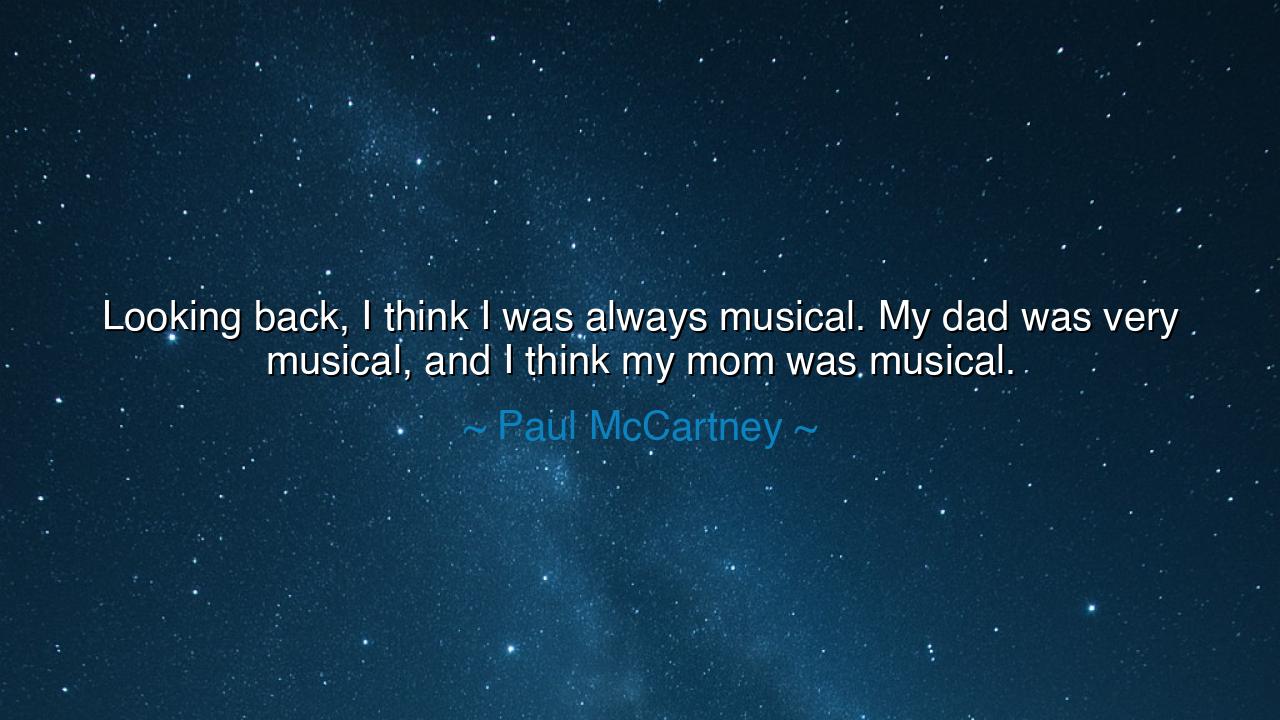
Looking back, I think I was always musical. My dad was very
Looking back, I think I was always musical. My dad was very musical, and I think my mom was musical.






When Paul McCartney said, “Looking back, I think I was always musical. My dad was very musical, and I think my mom was musical,” he spoke not merely of family or talent, but of the mystery of inheritance — the quiet passing of spirit from one generation to the next. In these gentle words lies an ancient truth: that what we become is often the echo of those who came before us. We are not born from nothing; we are continuations, living threads in the tapestry of time. McCartney’s reflection reveals that the music within him did not begin with his own hands or heart, but was awakened by the rhythm that had already been playing in the souls of his parents.
There is a sacred wisdom in such recognition. For when one looks backward and honors the lineage of gifts, one begins to see life not as a solitary flame, but as part of a greater fire — one that has burned through the ages. McCartney’s musicality, which would one day move millions across the world, was first kindled in the quiet rooms of his childhood, by a father who played piano and a mother whose presence carried harmony. Before the fame, before the stadiums and songs, there was the simple inheritance of sound and love — passed down not by lecture, but by example. Thus, the artist becomes not a creation of fame, but the fulfillment of family.
In the ancient world, this idea was known as the blood of the craft — the belief that the skills and passions of ancestors live within their descendants. The sculptor’s child might be born with steady hands, the poet’s child with a restless heart, the musician’s child with a rhythm already beating in their bones. Consider the story of Wolfgang Amadeus Mozart, whose father, Leopold, was himself a composer and teacher of music. From his earliest days, young Mozart was surrounded by melody. He breathed it as one breathes air. But it was not mere imitation — it was transformation. What began as inheritance became destiny. So too with McCartney: what was passed down became something greater, something transcendent, carried into the future through the power of creation.
And yet, McCartney’s words are more than gratitude; they are awakening. When he says, “I think I was always musical,” he hints at the eternal seed within every human soul — that hidden talent, that calling, that inner song that waits to be recognized. The ancients believed that within each person lies a divine spark, a daimon or guiding spirit, whispering the truth of who they are meant to be. For McCartney, that whisper was melody. For others, it might be invention, teaching, compassion, or courage. The wise know that to discover one’s gift is to rediscover one’s origin — to hear, once again, the song that has been echoing since birth.
But not all inheritances are gifts of skill; some are gifts of value — love, perseverance, humility, wonder. In McCartney’s reflection, there is also tenderness, for his mother, Mary, passed from life when he was still young. Yet even in absence, her influence remained. Her memory became part of his music, finding voice years later in songs like “Let It Be,” where a mother’s wisdom lives again through melody. This, too, is a form of musical inheritance — the turning of grief into harmony, loss into meaning. In such moments, we see that creativity is not only what we are given, but how we redeem what has been taken.
The ancients often said that art is memory made eternal. Through it, the living commune with the dead; the present speaks with the past. McCartney’s recognition that his music came from his parents is not nostalgia — it is continuity. It is the understanding that creation is never born in isolation, but always through connection. To make something beautiful, one must first listen to the echoes of those who came before — the lullabies, the stories, the laughter, the wisdom. Each generation adds a verse to the same unending song.
So, my listener, take this truth to heart: within you, too, lives the music of your ancestors. Their courage, their craft, their hopes — all flow through your veins like unseen rivers. You need only be still, and listen. Whether your inheritance is in art, kindness, curiosity, or resilience, honor it by nurturing it, by bringing it to life in your own way. Do not ignore the gifts that whisper within you. To do so is to silence not only yourself, but the generations that made you.
And when you look back, as McCartney did, may you see that your greatness did not begin with you — it began long before, in the humble acts of those who loved, who worked, who dreamed. Your task is not to repeat them, but to carry their song forward, adding your own verse to the eternal melody of humanity. For this is how legacies live — not in blood alone, but in the music of the soul, passed from heart to heart, age to age.






AAdministratorAdministrator
Welcome, honored guests. Please leave a comment, we will respond soon